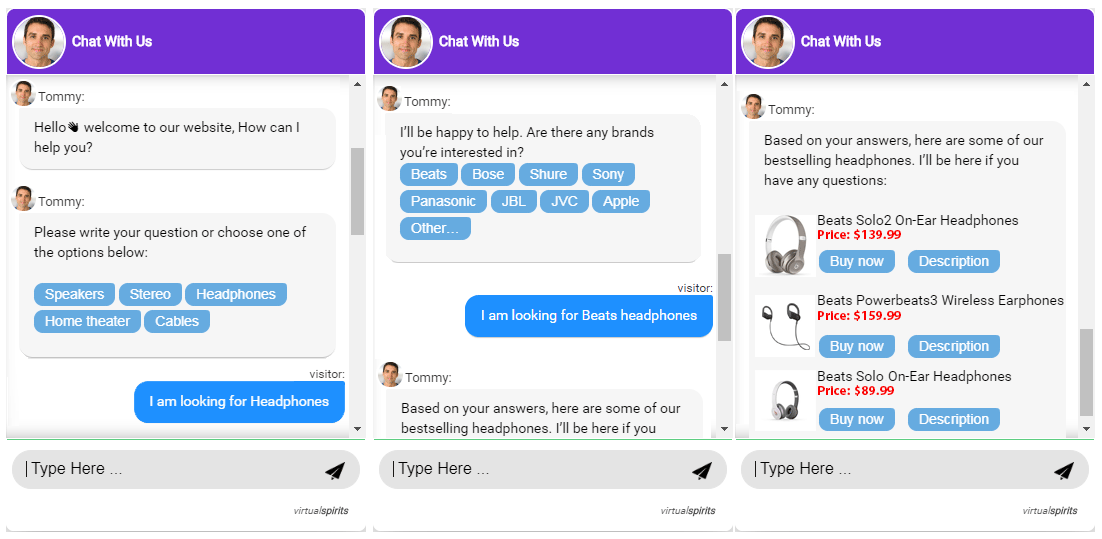
TOPICS:
Chatbot for Ecommerce Chatbot for Website Building a chatbot
Ecommerce Chatbot – Use Chat bots as Your Shopping Assistants
If you’ve been watching the ecommerce chatbot development space lately, you’ll know that online stores are discovering more and more uses for online chatbots. If you haven’t yet decided to create a chatbot for your own ecommerce business, this post will show you some great benefits your store can enjoy by appointing an AI bot as its virtual shopping assistant.
1. Engaging your store’s visitors.
The average online shopper usually looks at ten different stores at once, in the hopes of finding the product they want at the price they’re willing to pay. So when Liam decides to get himself a new pair of headphones, he’ll browse a bunch of different online stores in search of his favorite product. Let’s say that yours is one of the electronics e-stores that Liam visits. You will have a very tiny window of time within which you can get Liam’s attention. Once that window is gone, Liam will have moved on to the next website, where he sees the same headphones listed at a lower price.

This is where an ecommerce chatbot will help your business.
Chatbot:
“Hi! Are you interested in our audio products? We have a limited period offer (15% discount) on headphones and speaker systems, applicable on all major brands.”Liam:
“Is the offer applicable on [Headphone Model]?”Chatbot:
“Yes, it is! Have you also checked out these other models that have great reviews?”As can be seen in this interaction, the ecommerce chatbot manages to hold Liam’s interest, by first pitching a discount, and then recommending more options. Building chatbots thus helps ecommerce stores improve their customer retention rate, and even boost their sales figures if the chatbot manages to upsell or cross-sell products.
2. Simplifying choices for your customers.
Finding the right product on an ecommerce website is often like finding a needle in a haystack. Customers do appreciate having many different options to choose from, but the task of sifting, sorting and shortlisting your way through a whole inventory is never easy. Ecommerce chatbots can make it a bit easier, though. Let’s tweak our previous example a little, and imagine that Liam doesn’t already know which headphones he would like to buy. He arrives at your store’s website, and your online chatbot greets him.
Chatbot:
“How can I help you today?”Liam:
“I’m looking for headphones.”Chatbot:
“I’ll be happy to help. Are there any brands you’re interested in?”Liam selects a few brands from a list the chatbot presents him.
Chatbot:
“Are there any specific features you’re looking for in your new headphones?”Liam sees a list of options such as “Bluetooth connectivity”, “noise cancellation”, “wireless design”, “built-in mic”, and so on. He selects the ones that he would like.
Chatbot:
“Perfect! Based on your answers, here are some of our bestselling headphones. I’ll be here if you have any questions.”Liam receives a link to a page with a much smaller list of headphones. They are pre-sorted according to his preferences, and will be much easier to browse. Liam can even ask the chatbot to compare two or more headphones for him. In short, Liam’s buying experience becomes much more pleasant because of the presence of the ecommerce chatbot.
3. Giving out additional information.
In the process of shortlisting and buying products from ecommerce websites, customers often come up with additional questions and doubts that are not always related to the products themselves. To get the answers they need, they would have to leave the page they’re currently on, and go to the online store’s help section. Once there, they may or may not find the exact information they need. Building chatbots makes this whole exercise a cakewalk. The best chatbots are able to answer frequently asked questions like:
“What are the shipping costs?”“What if I get a defective product?”“What is your refund policy?”“Can I exchange a product if I don’t like it?”“Where can I find customer reviews for this product?”And so on. The ability to answer such questions, without forcing the customer to leave the product page, makes ecommerce chatbots an invaluable asset for any online store.
4. Checking order status:
If researching and buying products makes up one half of the online shopping experience, following up on existing orders usually forms the other half. Customers who have made a purchase from your ecommerce website will want to be updated on the status of their order, especially if their shipment seems to be taking longer than expected. The best chatbots for ecommerce websites are thus programmed to take care of questions like:
“Where is my order?”“My order has shipped. Can I cancel it now?”“When will I get the confirmation email for my order?”“Can I reschedule the delivery date for my order?”Among others.
With chatbot development, ecommerce websites have been able to move the bulk of their customer interactions to the virtual realm. Building chatbots that work as shopping assistants has allowed these stores to improve their customer service, conversion rates, and chances of getting repeat business.
If you’re looking to make the move and create a chatbot for your ecommerce website, we’ll be happy to help. Get in touch with us right here.